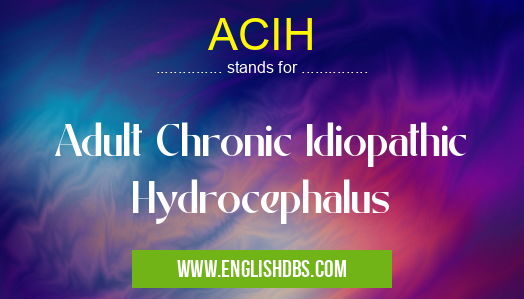What does ACIH mean in UNCLASSIFIED
ACIH stands for Adult Chronic Idiopathic Hydrocephalus, a condition characterized by an abnormal accumulation of cerebrospinal fluid (CSF) in the brain's ventricles. Unlike other forms of hydrocephalus, ACIH occurs in adults and has no known cause.

ACIH meaning in Unclassified in Miscellaneous
ACIH mostly used in an acronym Unclassified in Category Miscellaneous that means Adult Chronic Idiopathic Hydrocephalus
Shorthand: ACIH,
Full Form: Adult Chronic Idiopathic Hydrocephalus
For more information of "Adult Chronic Idiopathic Hydrocephalus", see the section below.
Symptoms of ACIH
Symptoms of ACIH can vary, but may include:
- Cognitive impairment
- Balance and gait issues
- Urinary and fecal incontinence
- Headaches
- Blurred vision
- Nausea and vomiting
Diagnosis of ACIH
Diagnosing ACIH involves a comprehensive evaluation including:
- Medical history and physical examination
- Neurological assessment
- Imaging studies (MRI or CT scan) to visualize the brain and ventricles
Treatment of ACIH
Treatment for ACIH typically involves surgical intervention to reduce the accumulation of CSF:
- Shunt surgery: A shunt is placed in the brain to drain excess CSF and redirect it to another part of the body.
- Endoscopic third ventriculostomy (ETV): A small hole is created in the floor of the third ventricle to allow CSF to flow more freely.
Prognosis for ACIH
The prognosis for ACIH can vary depending on the severity of the condition and the effectiveness of treatment. With early diagnosis and treatment, many individuals with ACIH can experience improved symptoms and maintain a good quality of life.
Essential Questions and Answers on Adult Chronic Idiopathic Hydrocephalus in "MISCELLANEOUS»UNFILED"
What is Adult Chronic Idiopathic Hydrocephalus (ACIH)?
ACIH is a condition characterized by an abnormal accumulation of cerebrospinal fluid (CSF) in the ventricles of the brain, leading to increased pressure within the skull. It develops in adults without an identifiable cause.
What are the symptoms of ACIH?
Common symptoms include headaches, memory difficulties, difficulty concentrating, impaired balance, and gait disturbances. In severe cases, it can lead to urinary incontinence, seizures, and dementia.
What causes ACIH?
The exact cause of ACIH is unknown, but several theories exist. Some researchers suggest impaired CSF absorption, while others implicate abnormalities in CSF production or flow.
How is ACIH diagnosed?
Diagnosis involves a comprehensive evaluation, including a medical history, physical examination, and imaging studies such as a computed tomography (CT) scan or magnetic resonance imaging (MRI) scan.
What are the treatment options for ACIH?
Treatment typically involves surgical intervention to divert CSF away from the ventricles. The most common procedure is endoscopic third ventriculostomy (ETV), where a small opening is created in the floor of the third ventricle.
What is the prognosis for ACIH?
With timely diagnosis and treatment, most individuals with ACIH experience significant improvement in their symptoms and overall quality of life. However, the condition can be progressive, and some patients may require ongoing monitoring or additional surgical interventions.
Final Words: ACIH is a complex condition that can significantly impact an individual's health and well-being. Understanding its causes, symptoms, and treatment options is crucial for proper diagnosis and management.
ACIH also stands for: |
|
| All stands for ACIH |
